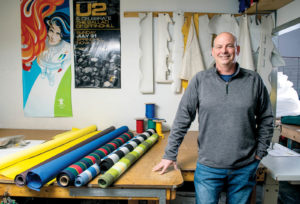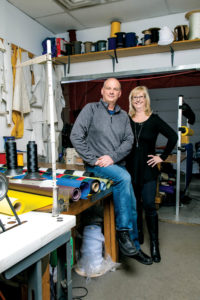 Nova Scotia is a small market and Halifax is a smaller city compared to some others, so we’ve had to diversify to continue a successful year-round employment,” says Paul Aumento, co-owner and president of Creative Textile Solutions Ltd., Halifax, Nova Scotia, Canada. “So we expanded our markets right away to include whatever can be manufactured related to textiles—and we’ve been successful doing that.”
Nova Scotia is a small market and Halifax is a smaller city compared to some others, so we’ve had to diversify to continue a successful year-round employment,” says Paul Aumento, co-owner and president of Creative Textile Solutions Ltd., Halifax, Nova Scotia, Canada. “So we expanded our markets right away to include whatever can be manufactured related to textiles—and we’ve been successful doing that.”
While studying geology at the University of Toronto in 1984, Aumento took a summer job at a local firm that manufactured and retailed marine canvas products. After a few years working there he returned to Halifax to join another marine canvas company that also manufactured awnings, canopies, tarpaulins and structures. Twelve years later, in 2001, he and his wife Elizabeth launched Creative Textile Solutions. Elizabeth is responsible for accounting and administration as administration and office manager. Paul heads up production, sales, design and logistics. “I grew up around yacht clubs and my father’s friends who built boats and sailed extensively,” he says. “I was a boater then and now, and it just worked out that my hobby turned into a profession. The companies I originally worked for taught me a lot.”
To everything there is a season…
The company’s core business includes awnings, commercial and residential canopies, banners, product repairs, and tarpaulins and covers. Seasonally, Creative Textile Solutions produces marine canvas products and environmental control products such as filter bags and turbidity booms. “We’re a value-added textile manufacturer, which includes the design, manufacture and service after the fact,” Aumento says. “We try to be as reactive as we can. If our clientele requires something that’s odd or different, a one-time or multiple production item, or if they need it in a rush—we try to accommodate them.”

Although seasonal, the environmental control products are a significant portion of Aumento’s business in the summer. “In the late 1980s and early 1990s the provincial government, in conjunction with the federal government, became much more active in providing information and laws that prohibit damage to the environment,” he says. “The company I worked for at the time was one of the first to establish and develop products locally to fulfill that requirement for contractors.”
Now, as Creative Textile Solutions, Aumento’s team provides filter bags, turbidity booms, curtains and to some extent, oil and soil remediation textile-related products to meet those needs. The company’s location allows it to service the market quickly, and with a turnkey approach. “We are located in such a way that we can service the market quicker rather than freighting very large containment booms from places further away, such as Toronto or Montreal,” he says. “We developed an approach to this that is very turnkey for our contractors. They can pick up the product, whether it’s 100 feet long or 1,000 feet long, and it’s ready to be deployed in their waterways, as opposed to some of our competitors that don’t have that option.”
Core capabilities
Aumento is always looking for new markets and is actively trying to increase the company’s product lines by looking for what might be a good fit with the standardized equipment he already has. “The environmental products utilize the same equipment as our heavy tarpaulin production—we use long-arm heavy-duty Consew and Juki sewing equipment—so the fit for this production was quite good,” he says.
One of the more unusual tarping projects Aumento and his team took on was for a local organics composting facility that needed the building’s roof and walls covered in polyethylene fabric tarping. The crew designed, manufactured and installed the tarping for the 20,000-square-foot facility to protect the steel from rotting because of the compost’s humidity and off-gassing. “It’s a positive-pressure building so everything is retained inside. Heat was an issue and the smell was horrendous,” he says. “The installation crew wore masks and full protective Tyvek® suits. It was one of our more unpleasant projects.”
It’s about people
To accommodate clients’ different requirements quickly and accurately, Aumento cross-trains employees, with a focus on quality end products and service at a fair rate. “With the lack of available industrial sewers and craftsmen it’s not always possible to have extra staff that are waiting for particular products to manufacture,” he says. “So we approach training in such a way that benefits our products as well as employees’ professional development. Everybody can do a certain percentage or total percentage of any given product, whether it be awning manufacturing and installation, tarpaulins, etc. It gives us some flexibility as well as providing employees added skills.”
The degree of cross-training each employee undertakes varies. All are trained in the “basics,” which include skills such as grommeting, managing the cutting table and installing awnings. “As the skills become more specialized, the more senior employees will take over,” Aumento says. “It also depends on the employee’s capabilities and level of interest. Some are not able or willing to do some of the heavier or dirtier work, so to some extent cross-training is individually driven.”
Aumento also values employees’ input on products and processes. “New ideas are very important. In order to have the employees fulfill themselves, as well as provide input to the company, we have to be open-minded to their ideas,” he says. “Experienced employees—and inexperienced employees—might have a totally different view of how to best approach production and efficiency. I find that most employees, when given the opportunity, will provide you with information that is beneficial.”
Whether interacting with employees or clients, Aumento stresses listening and resisting the urge to make assumptions. And when a project doesn’t meet the client’s expectations, he does his best to do what’s necessary to repair the situation. “Years ago we had a boat cover project that didn’t proceed very well,” he says. “So we replaced it at no charge to the customer. I never thought I’d see that customer again, but he came back a year or so later and said: ‘I’m back not because of what you made. I’m here because of how you fixed it.’
“That has stuck with me for many years,” Aumento adds. “We’re in a smaller municipality and a lot of our advertising is word-of-mouth. And no matter how big the city, you’re still a part of a small community. You never know who you’re talking to.”
Sigrid Tornquist is a writer and editor based in Minneapolis, Minn., and a regular contributor to Specialty Fabrics Review.
 TEXTILES.ORG
TEXTILES.ORG


